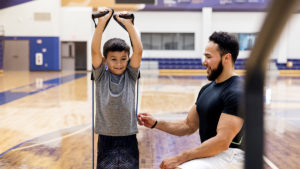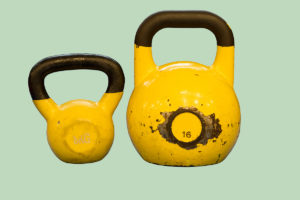Continuing Education/Articles
Training People With Disabilities
Exercise recommendations for people with disabilities like arthritis, hearing disabilities, visual impairments and intellectual disabilities.
Low Physical Activity Levels Still Help Mental Health
Low physical activity levels, even those below public health recommendations, can still reduce depression risks.
Strength Training for Youth
If you train kids, are you including youth strength training? Researchers share evidence-based benefits of training as early as age 5–7.
Walking Reduces Knee Pain
A regular walking program can reduce the incidence of new knee pain and slow joint damage for people over 50 coping with knee osteoarthritis.
Excess Weight Gain Among Americans
Fit pros may want to help young people with healthy habits, as most adult excess weight gain occurs in the first decade of adulthood.
Split Workout Routine or Full-Body Training
Women who are beginning a weight training program will see the same improvements with full-body training or a split workout routine.
Strength Training for Weight Loss
According to a research, strength training is effective for helping individuals with overweight or obesity with weight loss.
Sarcopenia May be Modified at Early Stages
Fitness professionals may want to encourage those in their early 60s in particular to train as a preventive measure against sarcopenia.
Running Speed Conserves Energy
For clients who can’t seem to increase their running speed, fit pros can share that it’s normal to default to an energy-efficient pace.
Kettlebell Training and Muscular Fitness in Men
To improve muscular endurance with kettlebell training, a periodized 6-week program produced more improvement than a nonperiodized one.
Women’s Sports Injuries
To address the gender gap in sports rehab, researchers created an overview of common women’s sports injuries and guidelines for rehab.
Exercise for Diabetes
To help those who manage diabetes, and the fit pros who train them, the ACSM issued updated guidelines on exercise for diabetes.
The Connection Between Pets and Wellness
Is there scientific evidence that pets can help us heal and thrive? And should personal trainers factor it into their program design?
Training Volume: Low Load Versus High Load
A new study provides insight into whether to go heavy with fewer reps or to go lighter for more training volume if the goal is muscle growth.
Engaging in Youth Fitness
Now is the time to focus on developing new means of professional direction and income, and youth fitness is a worthy consideration.
Weight Bias: How Does It Influence Our Industry?
This article focuses on weight bias—and how you can be more inclusive toward individuals of all body sizes and shapes.
Competitive Sports Performance With an Audience
Men run slower and women run faster in competitive sports without an audience, according to research in Psychology of Sport and Exercise.
Using Heart Rate Variability to Maximize Performance
Can fitness professionals use heart rate variability data to help clients fine-tune their workouts and their all-important recovery?
Resilience From Exercise Competency
Research shows that feelings of competence may facilitate an individual’s ability to optimize the resilience gained from physical activity.
Lift Weights for Better Sleep Quality
According to research, resistance training may be superior for sleep quality improvement than aerobic exercise or a combined weight/cardio workout.



















